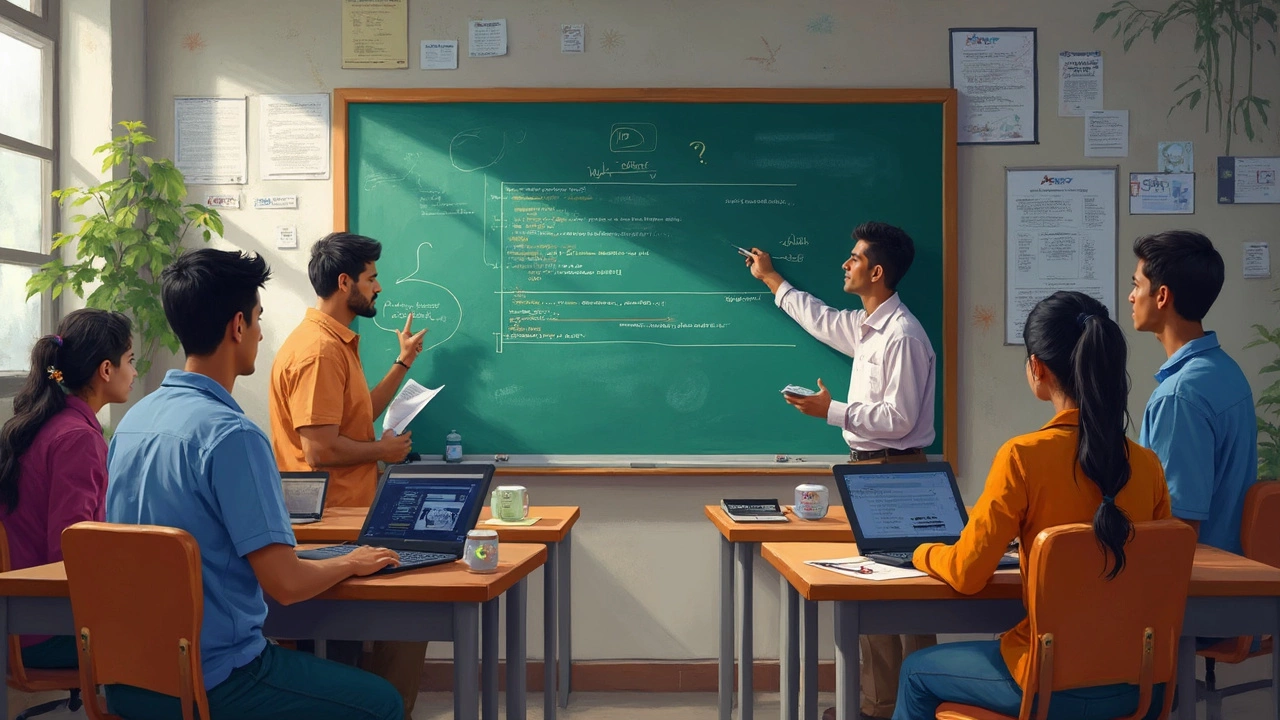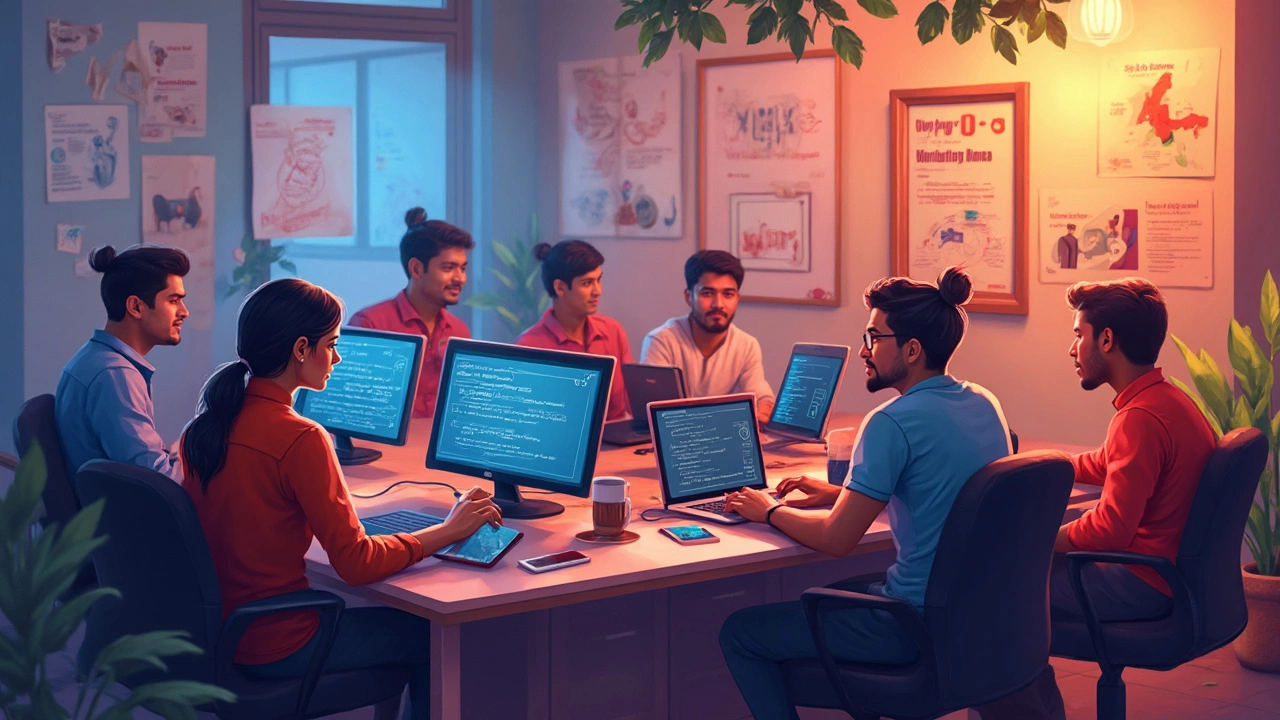Most people think of PHP as the dinosaur of web development, but the truth isn’t that simple. Despite all the buzz around newer languages, PHP quietly powers over 75% of the websites you visit—yes, even in 2024. Wordpress, Facebook’s early days, even Wikipedia? All PHP under the hood. That’s a lot of legacy and live code kicking around.
So if you’re wondering if it’s worth your time to pick up PHP now, it’s smart to look past the chatter and see what actually happens in the real world. Companies still run major sites on PHP, and they need folks who aren’t afraid of getting their hands dirty with server-side scripting. You might be surprised how many companies are looking for someone who can keep their massive backlog of PHP running smoothly (and updated for security).
Sure, it’s not the coolest language, but PHP is way less dead than you might have heard. If you care about employability, practical results, or launching quick web projects, PHP offers a path that’s both stable and forgiving for beginners. And let’s face it—learning something so widely used can open up steady freelance gigs or even offer an easy entry point if you’re just getting into backend development.
- PHP’s Unlikely Staying Power
- Where PHP Shines (and Where It Doesn’t)
- Job Market: Still Room for a PHP Developer?
- What You Need to Succeed with PHP
- Tips for Learning PHP Efficiently
- Where PHP Might Be Headed Next
PHP’s Unlikely Staying Power
PHP keeps showing up where you least expect it. While everyone’s talking about shiny new frameworks or languages, PHP just keeps quietly running most of the web. About 76% of all websites still use PHP on the backend, according to W3Techs’ 2024 data. That’s not a tiny slice—that’s the majority. Good luck finding another language with that kind of reach.
Why does this matter? Because this massive presence means millions of websites—and thousands of companies—just can’t ditch PHP overnight. Wordpress alone powers over 40% of the internet, and it’s 100% PHP at its core. Even big names like Wikipedia, Slack (for parts of their stack), and MailChimp rely on PHP for some of their core workloads.
Some folks figured PHP would fade when JavaScript got a backend boost (thanks, Node.js), or when Python and Ruby became trendy. But PHP did the opposite: it evolved. PHP 8, released in late 2020, made it faster and much more reliable. Features like JIT (just-in-time) compilation, better type handling, and cleaner error reporting turned PHP into something far smoother to use. Once clunky and awkward, now it’s a decent performer, even against newer stacks.
If you’re thinking about learning something that brings real, day-to-day value, PHP is a solid contender. It’s proven. People aren’t scrambling to rewrite entire applications in something else unless they really have to. Legacy systems are everywhere, and they really do need folks to maintain, optimize, or migrate them (a gig that usually pays well if you’re up for deep-dive work).
| Year | % of Websites Using PHP | PHP Major Release |
|---|---|---|
| 2015 | 82.3% | PHP 5.6 |
| 2020 | 79.1% | PHP 7.4 / PHP 8.0 |
| 2024 | 75.8% | PHP 8.2 |
Even after years of predictions about its demise, PHP keeps earning its spot. If you’re weighing what to put effort into, remember: stability and demand beat hyped-up fads almost every time.
Where PHP Shines (and Where It Doesn’t)
When it comes to fast web development, PHP is a reliable workhorse. Need to launch a blog, portfolio, or simple e-commerce store? With PHP, you’re just hours away from a working site, not weeks. It’s no exaggeration that over 800 million websites use PHP, mainly because it gets stuff done quickly without fuss. Wordpress, Joomla, Drupal—all run on it. If you’re working with shared hosting, there’s a 99% chance you’ll have native PHP support. That means less setup, fewer headaches.
Even big names like Facebook (at least in its early days) and Wikipedia chose PHP for its speed in shipping new features. PHP is made for mixing logic right into your HTML, so you can build, test, and fix features today—not someday. That’s a huge win for small businesses or solo developers.
What’s the catch? PHP isn’t always the best fit for everything. Apps that need real-time features like chats or live updates are easier built with Node.js. Advanced machine learning? Python has you covered there. And if you’re all about building slick, single-page apps, JavaScript frameworks are probably smoother to work with on the frontend and backend together. Plus—let’s call it out—PHP code can get messy fast if you’re not careful, especially with older projects built before modern best practices kicked in.
Here’s a quick look at where PHP nails it, and where it can trip you up:
- Rapid website development: Small to medium web projects, from blogs to stores.
- Huge content management systems: Wordpress, Drupal, Joomla, Magento.
- Extensive hosting options: Almost every hosting provider supports PHP out of the box.
- Resources galore: Tons of tutorials, packages, and decades of solved problems.
But keep these downsides in mind:
- Not ideal for real-time or event-driven apps.
- Hard to scale for some kinds of big, complex projects.
- Code quality varies wildly, especially on old projects.
- Fewer advanced features for concurrency compared to some modern languages.
If you like some actual data, check out this comparison of the most popular web tech stacks as of 2024 (source: Stack Overflow Developer Survey):
| Platform | Approx. Usage (%) |
|---|---|
| PHP | 77 |
| Node.js | 41 |
| Python (Django/Flask) | 31 |
| Ruby on Rails | 8 |
The bottom line: if your goal is to quickly build and run websites—especially with tight budgets and timelines—PHP gives you serious bang for your buck. But if you want to jump into bleeding-edge tech or real-time apps, you might want to check out the competition.
Job Market: Still Room for a PHP Developer?
If you think the job market for PHP is dried up, it’s time for a reality check. Despite not being the newest trend, PHP developers are still in steady demand. Job boards in 2024 show thousands of openings around the world for PHP work. Big companies rely on platforms like WordPress, Magento, and Drupal—all built with, you guessed it, PHP. And those platforms run millions of sites that need constant updates and new features.
Let’s put some numbers up. Here’s a quick look at job stats from May 2024:
| Platform | PHP Developer Jobs (Global, May 2024) | Median Salary (USD, US/UK Sample) |
|---|---|---|
| Indeed | 14,200 | $85,000 |
| 11,500 | $80,000 | |
| Upwork (Freelance) | 8,300 | Varies ($25–$90/hr) |
Sure, you’ll see a lot of listings asking for full-stack skills, but PHP is often at the center—companies want someone who can wrangle both the backend and a bit of front-end. On the freelance scene, PHP gigs show up constantly. Many small and mid-sized businesses run their websites on WordPress or custom PHP code and want ongoing support, not a total rewrite in the latest JavaScript flavor.
- Maintenance contracts: Lots of older sites need upgrades, bug fixes, or new features.
- Migrations: Companies moving to newer PHP versions or shifting from legacy systems often hire temp or contract help.
- Startups: Quick MVPs and projects with tight budgets often pick PHP for how cheap and fast it is to develop with.
One thing to keep in mind: more jobs now ask for modern PHP skills, like experience with Laravel or Symfony frameworks. If you can show off up-to-date knowledge, especially in big open-source systems, you’re already ahead of a lot of older PHP devs who stopped learning at PHP 5.
The market isn’t wild like it was in the mid-2000s, but it’s far from dead. If you’re willing to keep your skills fresh, PHP development offers real, steady opportunities—especially for people who aren’t chasing only the shiny new languages.

What You Need to Succeed with PHP
If your goal is to actually get paid or build cool stuff with PHP in 2024, you need more than just a basic grasp of syntax. It's about understanding the real-world tooling, the way modern PHP code is written, and which habits help you stand out from the average coder.
First off, every serious PHP developer should know their way around Composer. Think of it as npm for PHP—without it, managing dependencies or third-party libraries is a mess. You also can’t skip learning about frameworks. Laravel leads the pack for a reason: it’s powerful, readable, and makes growing projects easier. Symfony is also big in the enterprise world, so knowing both never hurts.
Here’s what you should focus on to get a real edge:
- PHP syntax and core functions—sounds obvious, but you'd be shocked how many skip the basics.
- Composer—handling libraries and dependencies is a must these days.
- At least one main MVC framework (Laravel is hot, Symfony is pro-level).
- Database handling with PDO or Eloquent ORM (SQL is still essential).
- REST APIs—most modern apps need to communicate with other services.
- Authentication and security basics—hackers love old or sloppy PHP.
- Version control with Git—don’t even think about skipping this.
- Debugging tools (like Xdebug) and testing (PHPUnit) to keep your code sane.
If you want numbers, check this out. According to data from Stack Overflow and GitHub (2024):
| Tool/Skill | Percentage of PHP Jobs Requiring |
|---|---|
| Laravel or Symfony | 87% |
| Composer | 78% |
| SQL/Database (PDO/Eloquent) | 93% |
| API Development | 82% |
| Git | 91% |
The secret sauce? Don’t just copy tutorials—build small projects of your own. Tackling stuff like a basic blog, a contact form with validation, or an API for a todo app will help you actually learn. Stuck? The PHP community is gigantic, and searching for answers on sites like Stack Overflow almost always gets a hit.
The bottom line: to really make it as a PHP developer now, embrace the tools and skills that employers are actually using. Picking those up puts you way ahead of folks who stop at the basics.
Tips for Learning PHP Efficiently
If you want to get up to speed with PHP fast, ditch the old-school textbooks. Focus on hands-on practice and real projects. The best way to understand PHP is by actually building something, not just reading about syntax.
Here are some tips used by people who land their first PHP jobs in months, not years:
- Set up a local development environment: Installing something like XAMPP, MAMP, or Laragon lets you test PHP code on your own machine. You can break things without worrying about messing up a real website.
- Start with real problems: Build a basic contact form, a simple blog, or even a personal homepage. You’ll hit real errors that force you to understand how PHP actually works.
- Follow official docs: The official PHP manual might look dull, but it’s surprisingly beginner-friendly. Bookmark it. You’ll search it more than Stack Overflow.
- Stick to PHP 7.4 or newer: Avoid any old tutorials using PHP 5 or earlier. PHP 8 brought way faster performance and new features—half the stuff in old courses is outdated.
- Get familiar with Composer: This is PHP’s package manager, like npm for JavaScript. Tons of jobs expect you to know it, and it’s a lifesaver when managing dependencies.
- Don’t skip error reporting: Set
error_reporting(E_ALL)anddisplay_errors = Onin yourphp.iniduring development. Seeing actual errors helps you fix things much faster.
If you’re aiming for a job, spend at least 25% of your time learning how PHP mixes with SQL, since so many projects rely on MySQL or MariaDB. Basic CRUD (Create, Read, Update, Delete) operations are the bread and butter of almost every entry-level PHP gig.
| Mistake | How to Avoid It |
|---|---|
| Copy-pasting code from old forums | Check the publication date – always use code for PHP 7.4 or 8.x |
| Not using prepared statements for SQL | Learn PDO and mysqli. Prevent SQL injection from the start. |
| Ignoring error messages | Make errors visible in your dev setup; read what they’re telling you. |
| Learning without building something | Always have a side project, no matter how simple. |
And here’s a pro tip: join PHP groups on Reddit or Discord. You’ll pick up short hacks, get feedback super fast, and see how working developers actually handle real issues. Tackling bite-sized projects, posting your code, and fixing mistakes in the open will help you move way faster than just grinding through tutorial videos.
Above all, don’t get stuck in tutorial hell. Give yourself two weeks maximum before you launch your own mini project. That’s where the real learning starts for PHP.
Where PHP Might Be Headed Next
PHP isn’t going anywhere, but it’s not standing still either. In 2024, the latest version is PHP 8.3, and it’s brought in real changes like better performance, typed class constants, and easier attribute handling. Big hosting companies and frameworks are bumping up support for new PHP features, so even old-school companies are upgrading instead of abandoning their codebase.
One thing to watch: major frameworks like Laravel and Symfony are still releasing new updates, attracting a younger crowd and making modern PHP easier to write and maintain. Even WordPress, which powers over 40% of all websites, keeps rolling out new builds built on top of updated PHP. That means if you know PHP, you’re keeping up with tech that hundreds of millions still use.
- Expect more features focused on better security and performance. Most recent versions made real strides against common attack vectors and speed bottlenecks.
- There's an active push for stricter typing. For beginners, this sounds scary, but it really helps keep projects from spiraling out of control as they grow.
- Automation and deployment tools are catching up. Now, deploying PHP is closer to what you’d expect with Node.js or Python workflows—think Docker and Composer doing more heavy lifting.
- The PHP community is still strong. Regular conferences, active forums, and tons of open source libraries mean you’re not working solo.
Here’s a quick look at some fresh data about PHP usage and modern features:
| Stat / Feature | 2022 | 2024 |
|---|---|---|
| % of Websites Using PHP | 77.3% | 76.5% |
| Latest Version | 8.1 | 8.3 |
| Typed Properties | Added in 2019 (v7.4) | Gaining adoption |
| Popular Frameworks (Laravel upgrades/year) | 2 | 3+ |
| Average Salary (US, mid-level dev) | $74k | $77k |
So, where’s PHP going? Most signs point to steady improvement, a slow but real shift to modern best practices, and a market that’s mature but not shrinking as fast as rumors claim. If you want to work on PHP projects, you’re investing in a skill that’s practical, in-demand, and pretty future-proof—at least for the next few years.



